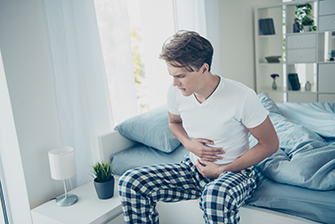Opioids are powerfully addictive substances that can cause uncomfortable withdrawal symptoms within a few hours after the last dose, depending on the length and severity of the addiction. Withdrawal symptoms can be life-threatening and often lead to relapse. Keep reading to find out more about opiate withdrawal, what to expect, how to help ease physical symptoms, and what to expect from professional help.
Opiate Withdrawal: What to Expect
When an individual begins using opioids, even as prescribed, they can become addicted. Using opioids triggers the brain’s reward system, causes a large dopamine dump and can make the brain chemically wired to require it. Tolerance, dependence, and addiction to opioids can cause severe withdrawal symptoms once the individual stops taking opioids. It takes the brain time to become re-wired back to its natural state and not require the opioids anymore to function.
Here is what you can expect in the early stages of opiate withdrawal:
First 24 hours after the last dose:
- Mood changes such as aggression, anxiety, and irritability
- Muscle aches
- Loss of appetite
- Insomnia
- Headaches
- Cravings
24-72 hours after the last dose:
- Sweating
- Flu-like symptoms
- Anxiety and panic attacks
- Gastrointestinal issues such as nausea, vomiting, and diarrhea
- Insomnia
Up to 2 weeks after the last dose:
- Anxiety
- Depression
- Fatigue
- Insomnia
- Cravings
Easing Physical Symptoms of Opiate Withdrawal
Opiate withdrawal is almost impossible to get through without professional help. There are so many behavioral, mental, and emotional issues to work through to untangle the addiction from the brain. In addition, it is very dangerous to stop taking opioids cold-turkey and should be done in a tapering-off process.
Tapering off of opioids slowly will allow for the most comfort and can be done at the individual’s own pace. No two people have the same addiction or detox needs, especially when it comes to opioids.
There are remedies for the physical symptoms of opiate withdrawal to help your body through these changes, many of which can be prescribed and distributed in a medication-assisted detox setting. Some medications you might receive include:
- Diarrhea medication
- Pain relievers such as Tylenol to help with aches and pains
- Dramamine to help with nausea
- Anti-inflammatory drugs such as Advil or Motrin
- Electrolyte solutions such as Pedialyte to help with dehydration
- Eating healthily to give the body the proper nutrition to get through the detox process and restore lost nutrition
- Exercising and staying active to produce endorphins and replace the body’s natural feel-good hormones
- Sleep aids
Medication-Assisted Detox
The best, safest, most comfortable, and most promising way to detox from opiates for long-lasting sobriety is by taking advantage of medication-assisted detox. As mentioned, opioids are very dangerous to quit cold turkey. Slowly tapering off the drug to experience minimal withdrawal symptoms, while allowing your body time to readjust, is the best remedy for opiate withdrawal.
In medication-assisted detox, you can expect:
- Our team of highly trained and experienced physicians, nursing staff, and clinicians
- 24/7 medical supervision and monitoring
- Nursing care and Incidental Medical Services available around-the-clock
- Provide relief from withdrawal symptoms
- Ensure clients’ safety
- Reduce the severity of withdrawal symptoms
- Vastly diminish any risk of life-threatening dangers during stabilization
Support and Treatment
Opiate withdrawal – while it is only a short period of time – is very uncomfortable, and the risk for relapse is extremely high during this time. This can cause an individual to abandon detox efforts and binge, which often leads to overdose. Getting sober from opioids with medication-assisted detox and working through the withdrawal symptoms is just the first step in the journey, and can be considered the easy part. Staying sober is where the work will come in.
Having support and treatment to stay sober is crucial. Without exploring the reasons for your addiction, learning the tools to stay sober, control cravings, recognize triggers, and explore new ways to destress, there is a very high likelihood that you will fall right back into an addiction. It is also very important to make sure you have support at home through family and friends to stay on track and to stay accountable.
This is especially true for individuals who suffer from mental health conditions, such as:
- Anxiety
- Depression
- PTSD
- Bipolar Disorder
- OCD
- Schizophrenia
- Social anxiety
About The Pointe Malibu Recovery Center
The best remedy for opiate withdrawal is medication-assisted detox while under medical supervision. If you have questions about medication-assisted detox and the medications used, treatment, support, or continuing care, or how to get started, reach out to us. We are here to help you.
Our highly trained and experienced physicians, nursing staff, and clinicians guide our clients through the medical detox and stabilization process, all the way through to the end of your child’s treatment stay. Our medical team works closely with each client to minimize the acute physical symptoms of withdrawal associated with stopping drug and/or alcohol use.
Nursing care and Incidental Medical Services (IMS) are available around-the-clock to monitor clients’ status, provide relief from withdrawal symptoms, and ensure clients’ safety. Our medical approach utilizes medications to reduce the severity of withdrawal symptoms and vastly diminishes any risk of life-threatening dangers during stabilization.
After stabilization, you will be ready to receive counseling — one-on-one, group, and family sessions — so that they can learn the tools needed to stay sober and treat any underlying causes and conditions.
If you’re ready to start your family’s journey to long-lasting recovery, we are here for you.





